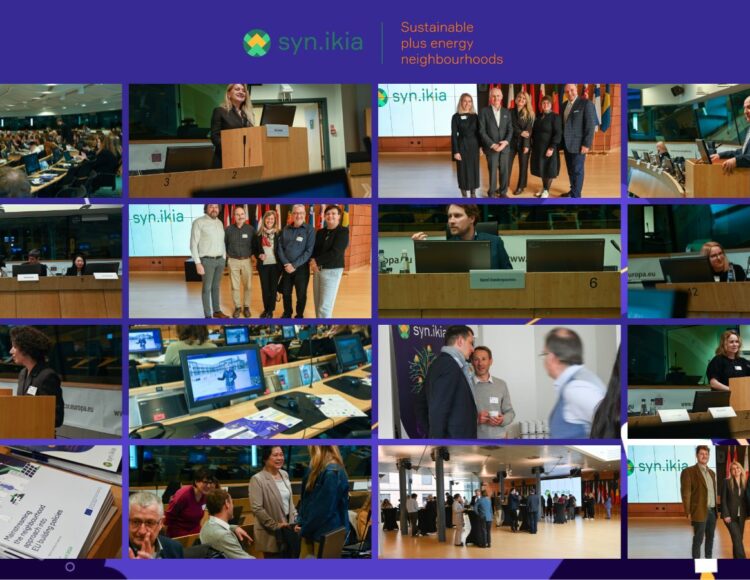On March 24th, 2025, the European Committee of the Regions in Brussels hosted the concluding event of the syn.ikia project, marking five years of pioneering work on Sustainable Plus Energy Neighbourhoods (SPENs). This milestone event celebrated significant achievements in combining climate resilience, social inclusion, and affordable housing solutions.
Driving Sustainability and Affordability Together
syn.ikia demonstrated that ambitious climate goals could align seamlessly with social and public housing priorities. The project successfully delivered 363 housing units across four demonstration neighbourhoods—Verksbyen (Norway), Uden (Netherlands), Barcelona (Spain), and Salzburg (Austria)—with the majority specifically designed for social and public housing. These projects showed that SPENs are not only achievable but can significantly contribute to housing affordability and social cohesion.
Neighbourhood-Level Innovation for Just Transition
The conference underscored neighbourhood-scale developments as key catalysts for a socially fair energy transition. Unlike individual building projects, neighbourhood-level initiatives facilitate shared energy solutions, inclusive community participation, and more efficient use of public resources. The syn.ikia Multiple Benefits Tool developed within the project highlighted tangible impacts like reducing energy poverty and enhancing resident well-being—critical priorities for public housing providers.
Key Role of Housing Europe in the Project
Housing Europe, as a key partner in syn.ikia, emphasized the importance of integrating social objectives into energy transition strategies. Secretary General Sorcha Edwards and Policy Director Julien Dijol highlighted that effective partnerships between social and public housing providers, municipalities, and residents are vital for ensuring that climate action remains equitable and affordable. They called for stronger funding mechanisms and public investment to support social and cooperative housing sectors in delivering SPENs at scale.
Addressing Housing Affordability and Financing Gaps
A core focus of the discussions was housing affordability in the context of rising housing and energy costs across Europe. Speakers, including Andres Jaadla from the Estonian Union of Housing Associations, stressed the need for public and regulated private investment frameworks to finance SPENs sustainably. The Danish National Building Fund was spotlighted as a successful model demonstrating how innovative public-private financing can enable social housing providers to deliver ambitious energy-positive projects.
Policy Recommendations and Regulatory Frameworks
Participants called for more supportive regulatory frameworks to enable decentralized energy systems and neighbourhood-scale energy sharing, essential for social housing communities. Regulatory innovation and flexibility are crucial, as highlighted by Ole-Edvin Utaker (Arca Nova Group), ensuring that technological progress benefits residents directly, especially in the context of social housing.
Engaging Residents for Long-Term Success
syn.ikia emphasized resident participation and trust-building as central to its methodology. Successful demonstrations from Salzburg and Barcelona illustrated how involving residents early significantly boosts acceptance, ensuring sustainable projects are also socially successful. Public and cooperative housing contexts were recognized as particularly well-suited to this inclusive, resident-focused approach.
Next Steps and Housing Europe’s Commitment
Looking forward, Housing Europe will continue advocating for EU and national policies supporting sustainable, inclusive neighbourhood-scale projects. The syn.ikia project’s outcomes, including innovative tools such as the SPEN Compass and Multiple Benefits Tool, offer valuable resources for housing providers aiming to replicate and scale these proven solutions.
As Europe advances its climate ambitions, syn.ikia has set a clear path demonstrating that sustainable energy neighbourhoods and social equity go hand-in-hand. Housing Europe remains committed to championing SPENs as a vital strategy for achieving affordable, resilient, and inclusive communities.
Read the original article here.
